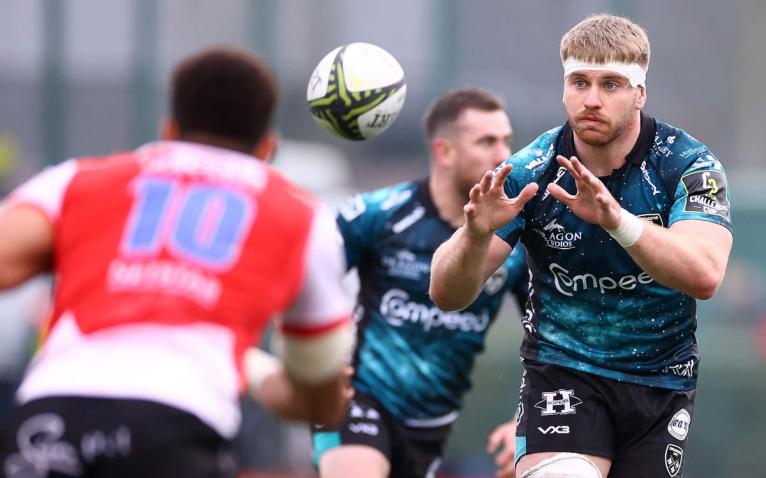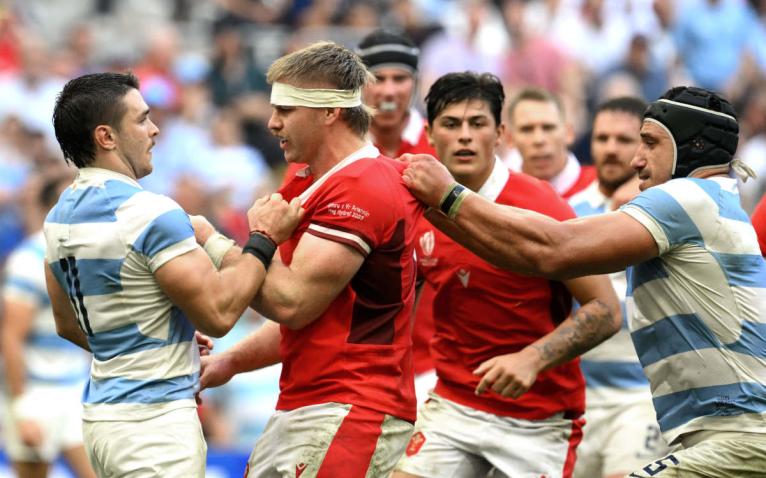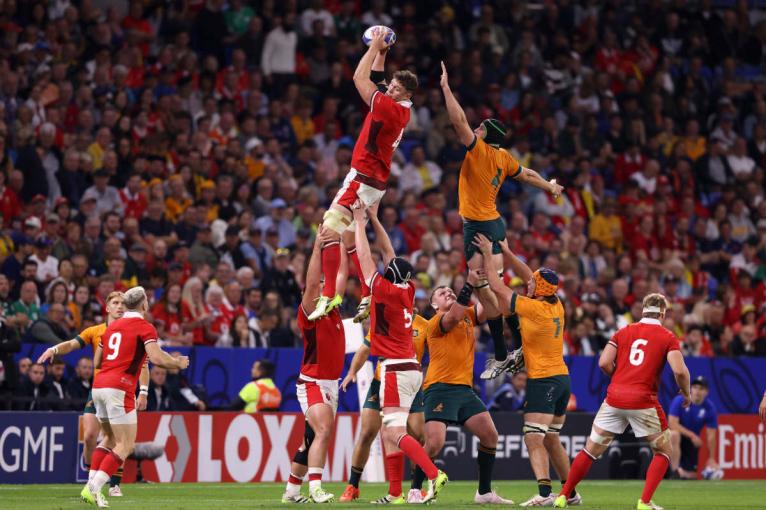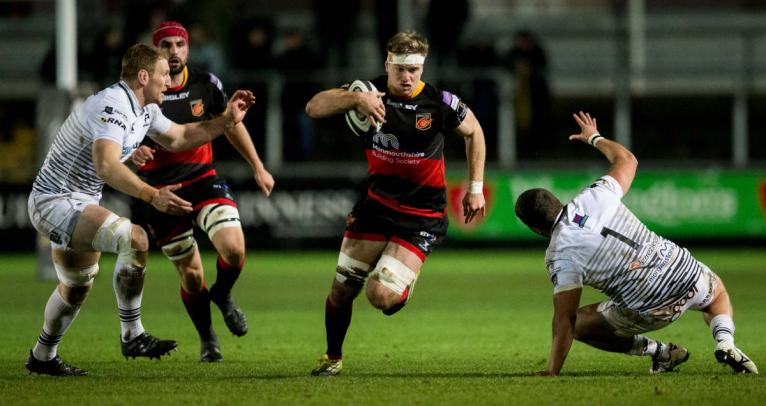Aaron Wainwright’s story is one of resilience and belief.
Four years ago, the moustachioed 22-year-old scooped up the ball on the halfway line against France in the quarter-final of the Rugby World Cup in Oita, and bolted away, leaving Rabah Slimani and Wenceslas Lauret grasping at thin air as he dotted down under the posts, with a toothy smile.
With 18 caps in as many months, a glittering career ahead of him looked assured, with some of rugby’s cognoscenti stating with confidence that Wainwright would be a shoe-in for the 2021 Lions tour. The reality was somewhat different. Warren Gatland departed and in came Wayne Pivac bringing new ideas, personnel and players. Wainwright went from a mainstay of the Welsh pack to bit-part player, and finally to looking in from the outside, as he was omitted from the 2022 Six Nations squad, missing the successful South Africa tour that summer and missing out in the Autumn internationals.
At 25, the peroxide-blond back-row was at a crossroads, but his break came with the departure of Pivac and his coaching team and the re-appointment of Gatland, a staunch ally and a coach who had given him his Wales debut. A strong 2023 Six Nations campaign, followed by a standout World Cup showing, sees Wainwright now playing with a conviction that had wavered in dark times.

His ebullience has carried over to his regional form, where against the Lions in Johannesburg, we saw Wainwright at his devastating best. Early on, his 45-metre lung-busting carry, after a pass by Harrison Keddie, was followed by a whip-smart pass from the base of the next breakdown and strength on the try-line to repel defenders helped Keddie dot down. In 17 seconds, it showed how effective Wainwright could be if his strengths were harnessed correctly. He followed that piece of individual brilliance with a man-of-the-match performance against Oyonnax last weekend, showing a player reaching the peak of his powers.
When Gats came back in he sat me down. He told me I was going to be in the side for the things I was really good at, like my attacking game, not what I could be good at. The way he goes about his business, he makes you want to get better.
“It might sound weird saying this, but I’m glad it [getting dropped] happened because it ignited a fire in my belly,” Wainwright said. “It spurred me on and motivated me to push harder. I knew I wasn’t in favour and I knew wasn’t getting picked. The feedback I was getting was that my defensive side wasn’t up to scratch or as strong as other back-rowers in Wales; technical pointers like my post-tackle work, jackaling and dominant tackles. I took it on board and worked on those little improvements with extra sessions but the feedback was that it still wasn’t good enough.”
Wainwright, who is affable and low-key, without a scintilla of arrogance, took the constructive criticism to heart. “The problems started when I was spending too much time trying to hone my perceived weaknesses and it was taking away from what I was really good at. When Gats came back in he sat me down. He told me I was going to be in the side for the things I was really good at, like my attacking game, not what I could be good at. The way he goes about his business, he makes you want to get better. What he said resonated with me.”

While Wainwright is reticent about picking out individuals, it is clear the 43-cap Dragon found the period kicking his heels outside the Welsh camp frustrating. “When you’re in a pattern of getting told that you’re still not good at the things you’ve been working so hard on, it’s very demotivating. I went through a phase of thinking I’d done a lot of extras and I still wasn’t getting picked – I couldn’t work out in my head why it wasn’t happening.”
Now ensconced in the Welsh squad once again, as one of their primary ball-carriers, Wainwright is expected to be a key part of Warren Gatland’s plans for the opening Six Nations fixture against Scotland in 50 days, and is keen to make up for lost time. How does he improve? “It’s more a mindset than anything else, making sure I’m motivated emotionally and hungry for work out on the field.”
Of course, you remember the rugby, the results and how you played, but it was spending time together that really benefitted us. The bonds we made. That reflected on the pitch when we had to dig in
After a barren 2022, Wainwright’s attitude is summed up by the Stereophonics’ album, You Gotta Go There To Come Back, and not wasting a moment. “Playing for Wales is such a privilege. I enjoyed the World Cup and soaked it up because 2019 went by in a blur. My family were there for every game, my mates made sure they came out as often as possible. Of course, you remember the rugby, the results and how you played, but it was spending time together that really benefitted us. The bonds we made. That reflected on the pitch when we had to dig in against the likes of Fiji.”
Wainwright struck up multiple friendships over the summer, which should benefit a young Welsh squad that has Rob Howley back within the core management team.
“I got on really well with the Cardiff boys, Mason Grady and Tomos Williams. Tomos is a great laugh behind closed doors, while Taulupe (Faletau) is also someone I’m close to.”

One man who made a real impression out in France was his former Dragons team-mate, Will Rowlands, who added some intellectual gravitas to proceedings.
“I’m missing Will already,” Wainwright smiles. “He’s too intelligent for most of us, on a different level and at opposite ends of the spectrum to Corey Domachowski,” he chuckles.
“During the World Cup, we all had our own committees and Will was leading ‘thought for the day’. He did a series of presentations about global economics. Seeing the boys trying to take in what he was saying as he went through these complex ideologies and graphs was quite something. Even I couldn’t understand it. He’s certainly someone you’d go to for financial advice.”
Who better to watch than Taulupe? Just watching him day-to-day, how he trains, how he goes about his business, is awesome. On the park, it’s his hunger to get on the ball, use his footwork and that precious ability to get over the gainline and deliver those big game moments.
Wainwright, who is happy to pack down on the blindside, but prefers the No 8 position, is part of a new hybrid style playmaker at the base of the scrum. A heavily muscled, explosive athlete, who weighs in under 110kgs, he bears more resemblance to Ben Earl and Ardie Savea than the traditional gargantuan, less agile back-row titans such as Billy Vunipola and Duane Vermeulen. Fortunately, he has one of the greatest modern-day No 8s to learn off in Faletau, who is seven years his senior.
“Who better to watch than Taulupe? Just watching him day to day, how he trains, how he goes about his business, is awesome. On the park, it’s his hunger to get on the ball, use his footwork and see how he creates space in such small pockets. He has that precious ability to get over the gainline, beat defenders and routinely deliver those big game moments. If I ask him for advice, he’s more than happy to chat but he’s so humble. He is the complete role model for any youngsters coming through.”
The absence of Faletau, and injuries to Liam Williams and Dan Biggar, was given as a reason Wales started to see their semi-final hopes ebb away against Argentina in Marseille, and Wainwright physically winces when talking about their 29-17 loss.

“I’m not afraid of saying, we should have won that game. We had so much control in the first half. We should have kept the scoreboard ticking over more and been more accurate when we had chances. It hurt then, and it hurts now. I felt for the older boys like ‘Biggs’ and Taulupe. They were despondent after the whistle. We’d come so far since the Six Nations but with any luck we can take that hurt and learnings into the Six Nations.”
At regional level the Dragons are still struggling for consistency. Tub-thumping wins over the Ospreys and Oyonnax were negated by dispiriting heavy losses to Munster, Leinster and the Sharks, where Wainwright was put on the spot about whether Dai Flanagan’s men had ‘given up’. Wainwright accepts it’s a fair question. How can you motivate a side that loses more often than it prevails?
“Obviously we lose more than we win at the Dragons. For me, it’s about working with senior players and building belief. I think we are a good enough team to get results but we have to be more accurate. Once the mistakes start, it’s like a snowball effect and we have to do better.”
The main thing that will drive engagement is winning and when that happens, we’ll get more bums on seats
Like Dewi Lake, and many other regional stars, they know results is the currency that will lead to more fans returning through the turnstiles.
“The main thing that will drive engagement is winning and when that happens, we’ll get more bums on seats. I believe that when we do play well, we play an exciting brand of rugby. Off the pitch, we have a community team who work so hard for the region. For example, we had 7,000 people at a firework display recently and we had 4,500 people at the Leinster game. You think, how do we bridge that gap? It starts with us on the pitch getting results. From there, everything falls into place.”
Wainwright 2.0 has learnt that giving up is not an option. Good times, hopefully, lie ahead.


Comments
Join free and tell us what you really think!
Sign up for free